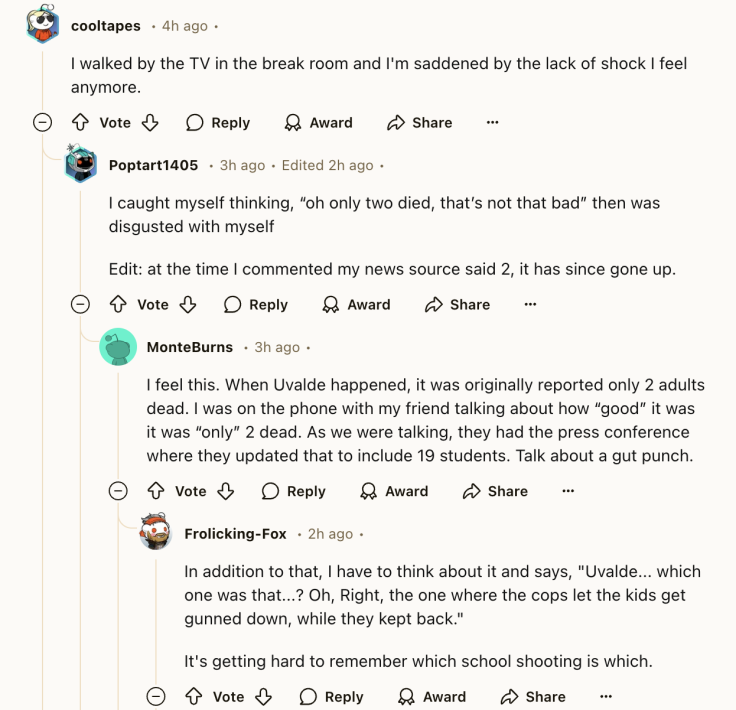'Only Two Dead? That's Not Bad': Reactions to Madison School Shooting Highlight America's Fatigue

The tragic shooting at Abundant Life Christian School in Madison, Wisconsin, where a teenage girl killed a student and teacher before turning the gun on herself, has reignited discussions about "school shooting fatigue" in the United States.
Public reactions, characterised by resignation and numbness, highlight the emotional toll and deep sense of helplessness stemming from the relentless cycle of mass shootings.
The Incident and Immediate Aftermath
On Monday morning, Madison police responded to reports of gunfire at the private Christian school, which serves approximately 400 students.
According to Madison Police Chief Shon Barnes, the shooter, a student herself, used a handgun to carry out the attack. Six others were injured, with two remaining in critical condition.
Authorities have not yet disclosed a motive, but Barnes appealed for compassion during a press conference, saying: "As difficult as today is, that's still someone's child who is gone."
The incident unfolded just days before the school was set to close for the holiday break, compounding the emotional devastation for the local community.
A Troubling Sense of Numbness
While school shootings have historically provoked national outrage, reactions to the Madison tragedy underscore a disturbing shift in public sentiment.
On platforms like Reddit, users expressed a sense of resignation and self-disgust over their muted emotional responses.
One user admitted: "I caught myself thinking, 'Oh, only two dead? That's not that bad,' and then I was disgusted with myself."
Another reflected: "It's horrifying how numb we've become. When Uvalde happened, I had to remind myself which shooting it was—there have been so many."
This desensitisation reflects "psychic numbing", a term used by psychologists to describe how repeated exposure to large-scale tragedies dulls emotional reactions.
According to the American Psychological Association (APA), this fatigue often stems from a feeling of helplessness—when a problem feels insurmountable, the brain disengages as a coping mechanism.
Paul Slovic, a professor of psychology at the University of Oregon, explains this phenomenon as the "deadly arithmetic of compassion": "The human brain struggles to scale emotions proportionately. One death feels tragic, but when the numbers increase, our emotional capacity doesn't expand. Instead, we feel less."
The Psychological Impact on Americans

The regularity of mass shootings has created a mental health crisis across the country.
According to Everytown Research, there have been at least 200 incidents of gunfire on school grounds in 2024 alone, resulting in 55 deaths and 147 injuries.
This relentless violence, amplified by media coverage, has left Americans—especially children—trapped in a cycle of fear and anxiety.
A 2022 study published by the APA found that constant exposure to mass shootings increases symptoms of anxiety, hypervigilance, and avoidance behaviours.
For young people, the toll is particularly severe.
Many now consider school shooter drills a normal part of their education, which experts say contributes to "a back-of-the-mind stress" that inhibits learning and emotional development.
As one Redditor put it: "Kids don't know a world without active shooter drills. It's become their normal, and that's terrifying."
Helplessness and Collective Trauma
The feeling of helplessness is a recurring theme in discussions around mass shootings.
After high-profile tragedies like Sandy Hook, where 20 young children were murdered, the failure to enact substantial policy change has left many Americans hopeless.
One Reddit user lamented: "If nothing changed after Sandy Hook, it never will. That's when I knew we'd just accepted this as normal."
This sentiment reflects what psychologists call "collective trauma", where repeated exposure to mass violence erodes the public's sense of safety and efficacy.
Dr Roxane Cohen Silver, a professor at the University of California, describes it as a "cascade of collective traumas" that contributes to widespread emotional fatigue.
Such exhaustion fuels a dangerous cycle: "People feel powerless to fix the problem, so they disengage, which allows the cycle to continue," explains Silver.
National Figures Call for Action
The Madison tragedy has prompted renewed calls for action.
President Joe Biden urged Congress to pass gun control legislation, saying: "It is unacceptable that we cannot protect our children from this scourge of gun violence."
Similarly, Milwaukee Bucks coach Doc Rivers expressed frustration, stating: "Kids can't even go to school safely anymore, and it seems like we don't do anything about it."
Despite these appeals, progress on gun reform remains gridlocked, leaving communities to grapple with the devastating consequences of inaction.
A Nation Desensitised
The reaction to the Madison school shooting reflects a stark reality: in a country where mass shootings have become tragically routine, even the loss of innocent lives struggles to elicit shock.
One Reddit user summarised this unsettling shift: "If there aren't at least five dead, it barely makes the news. How did we get here?"
As mass shootings persist, experts warn that the growing numbness and helplessness must not become permanent.
Dr Paul Slovic offers a glimmer of hope: "Even small steps can make a difference. We cannot allow ourselves to underreact just because the problem feels too big."
© Copyright IBTimes 2025. All rights reserved.




















